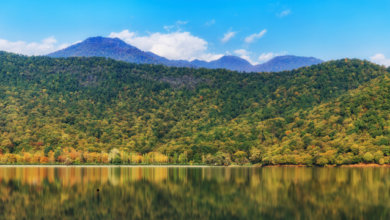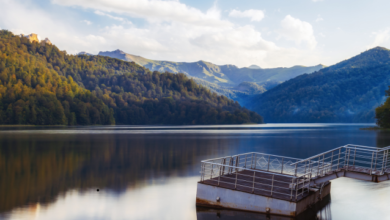
Religion in Baku, Azerbaijan: A Guide to Understanding the Country’s Spiritual Landscape
Azerbaijan, and its capital Baku, is a melting pot of cultures, traditions, and religions. Due to its location at the crossroads of Europe and Asia, Azerbaijan has been influenced by various religious traditions over the centuries. Although predominantly a Muslim-majority country, Azerbaijan is known for its religious tolerance and secular governance, with the capital city Baku being a symbol of this harmonious coexistence.
In this blog, we’ll delve into the religious history of Baku, explore the main places of worship, and provide a guide for visitors interested in learning more about the religious diversity of the city.
A Brief History of Religion in Azerbaijan
Azerbaijan’s religious history dates back to ancient times when fire worshippers, known as Zoroastrians, inhabited the region. Over the centuries, the country became a part of the Persian Empire, where Zoroastrianism flourished. With the spread of Islam during the 7th century, Azerbaijan gradually became a Muslim-majority region. Today, Islam remains the dominant religion, with most of the population identifying as Shia Muslims, though there is also a significant Sunni Muslim minority.
Despite Islam being the dominant faith, Azerbaijan has a long-standing tradition of religious tolerance, with the country home to Christian, Jewish, and Zoroastrian communities, all coexisting peacefully.
Religious Landscape in Baku
Baku, as the capital of Azerbaijan, is a reflection of the country’s secular governance and religious diversity. The city is home to numerous mosques, churches, synagogues, and even ancient Zoroastrian sites, making it a fascinating destination for those interested in religious history and architecture.
1. Islam in Baku
Islam is the primary religion in Azerbaijan, and Baku is home to many mosques, both ancient and modern. The majority of Azerbaijan’s Muslims follow Shia Islam, though there is also a significant Sunni population, and both communities worship side by side in the city.
- Taza Pir Mosque: One of the most important mosques in Baku, Taza Pir Mosque was built in 1914 and is a stunning example of Islamic architecture. The mosque is known for its impressive dome and intricate carvings, and it remains an active place of worship.
- Heydar Mosque: The Heydar Mosque, named after Azerbaijan’s former president Heydar Aliyev, is one of the largest and most modern mosques in Baku. Completed in 2014, it can accommodate thousands of worshippers and is a testament to the country’s Islamic heritage.
- Juma Mosque: Located in the heart of Icherisheher (Old City), Juma Mosque is one of the oldest mosques in Baku, dating back to the 12th century. Its beautiful architecture and historical significance make it a must-visit site for those exploring the Old City.
Travel Tip: Visitors are welcome to visit the mosques in Baku, but it’s important to dress modestly and remove shoes before entering the prayer areas. Friday prayers (Jumu’ah) are the busiest times, so plan your visit accordingly.
2. Christianity in Baku
Although Azerbaijan is predominantly Muslim, Baku has a small but active Christian community. The city is home to several churches that cater to various Christian denominations, including Orthodox, Catholic, and Protestant communities.
- Church of the Saviour: This Lutheran church, built in 1899 by German settlers in Baku, is one of the most beautiful and historically significant Christian places of worship in the city. The Church of the Saviour features a striking Gothic Revival architectural style, and although it no longer functions as a place of worship, it now serves as a concert hall for classical music performances.
- Holy Myrrhbearers Cathedral: This Russian Orthodox cathedral is the largest Orthodox church in Baku and serves the city’s Russian-speaking Christian community. It is known for its stunning frescoes and peaceful atmosphere.
- St. Mary’s Catholic Church: This modern Catholic church, completed in 2007, caters to Baku’s small Catholic community. The church holds regular services in several languages, including English, Russian, and Azerbaijani.
Travel Tip: Many of Baku’s churches offer tours or are open to visitors outside of service times. Check the schedules before visiting to avoid interrupting worship services.
3. Judaism in Baku
Azerbaijan is known for its Jewish community, which has lived in the region for centuries. Baku is home to two main synagogues that serve the local Jewish population, which is comprised of Mountain Jews, Ashkenazi Jews, and Georgian Jews.
- Mountain Jews Synagogue: Located in the heart of Baku, this synagogue serves the Mountain Jews, a community that has lived in Azerbaijan for more than 2,000 years. The synagogue is a symbol of the religious tolerance and coexistence that defines the country.
- Ashkenazi Synagogue: This synagogue caters to the Ashkenazi Jewish community in Baku. It is an active place of worship, and visitors are welcome to learn more about the rich Jewish heritage in Azerbaijan.
Travel Tip: The synagogues in Baku welcome visitors but be sure to dress modestly and respect religious customs, especially during prayer times or Jewish holidays.
4. Zoroastrianism and the Ateshgah Fire Temple
Zoroastrianism, one of the world’s oldest monotheistic religions, once flourished in Azerbaijan, and its influence can still be seen today, particularly in Baku’s Ateshgah Fire Temple. Located on the Absheron Peninsula, about 30 kilometers from central Baku, this ancient temple was a place of worship for Zoroastrians and Hindus alike.
- Ateshgah Fire Temple: This 17th-century fire temple is built around a natural gas vent that produced a continuous flame, which was considered sacred by the Zoroastrians. The temple complex is a fascinating historical site, with ancient inscriptions and chambers that once housed fire-worshippers. Although the natural flame no longer burns, the temple is still an important symbol of Azerbaijan’s fire-worshipping past.
Travel Tip: A visit to the Ateshgah Fire Temple can be easily combined with a trip to Yanar Dag, another natural flame site. Both locations offer insight into the country’s ancient connection with fire and Zoroastrianism.
Secularism and Religious Tolerance in Azerbaijan
Azerbaijan is a secular state, meaning that religion is separate from government, and freedom of religion is guaranteed by the country’s constitution. Baku, in particular, is known for its open-mindedness and tolerance of various religious practices. The city’s residents take pride in the peaceful coexistence of multiple faiths, and religious conflicts are rare.
- Interfaith Harmony: Baku is often cited as a model for religious tolerance, with Muslims, Christians, Jews, and people of other faiths living and working together harmoniously. Religious holidays like Ramadan, Christmas, and Rosh Hashanah are observed and respected, and places of worship for all religions are well-maintained.
Travel Tip: While Baku is a secular city with modern attitudes, it’s always a good idea to show respect for local customs and traditions when visiting places of worship. Dress modestly, behave respectfully, and be mindful of religious practices during your visit.
Conclusion: Discover the Spiritual Diversity of Baku
Baku is a city where the ancient and the modern come together, offering visitors a chance to explore its rich religious heritage and diverse spiritual landscape. From the beautiful mosques and churches to the historic Zoroastrian fire temples, Baku offers a fascinating journey through centuries of religious history.
- For history enthusiasts: Visit the Ateshgah Fire Temple to explore Azerbaijan’s ancient fire-worshipping traditions.
- For architecture lovers: Discover the stunning Islamic and Christian architecture in mosques and churches across the city.
- For those interested in religious diversity: Experience the peaceful coexistence of Baku’s Muslim, Christian, Jewish, and Zoroastrian communities.
Baku’s religious landmarks are not only places of worship but also symbols of the city’s open-mindedness, tolerance, and respect for different faiths. Whether you’re visiting for spiritual reasons or simply to admire the beauty of these historical sites, Baku’s religious landscape is sure to leave a lasting impression.




